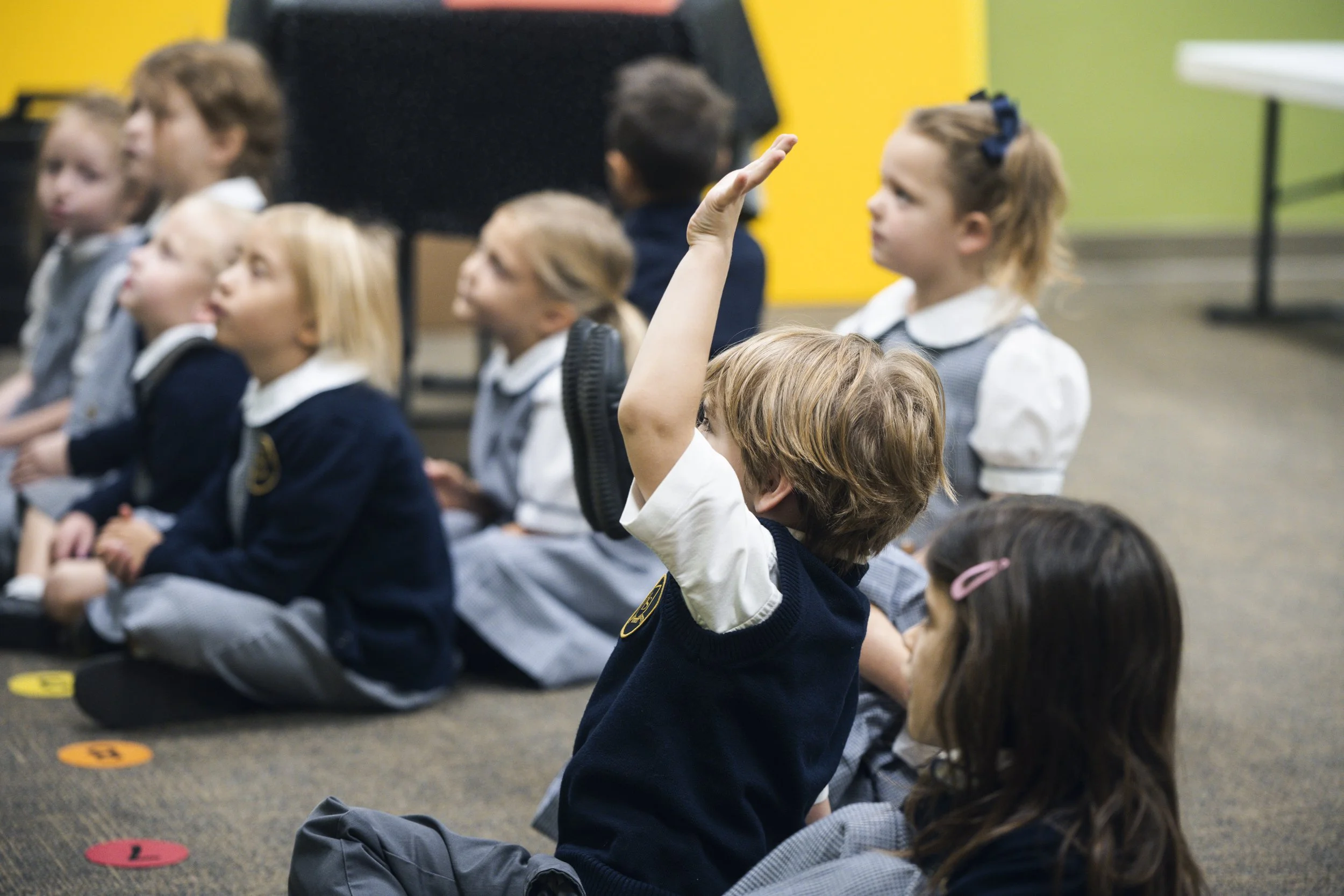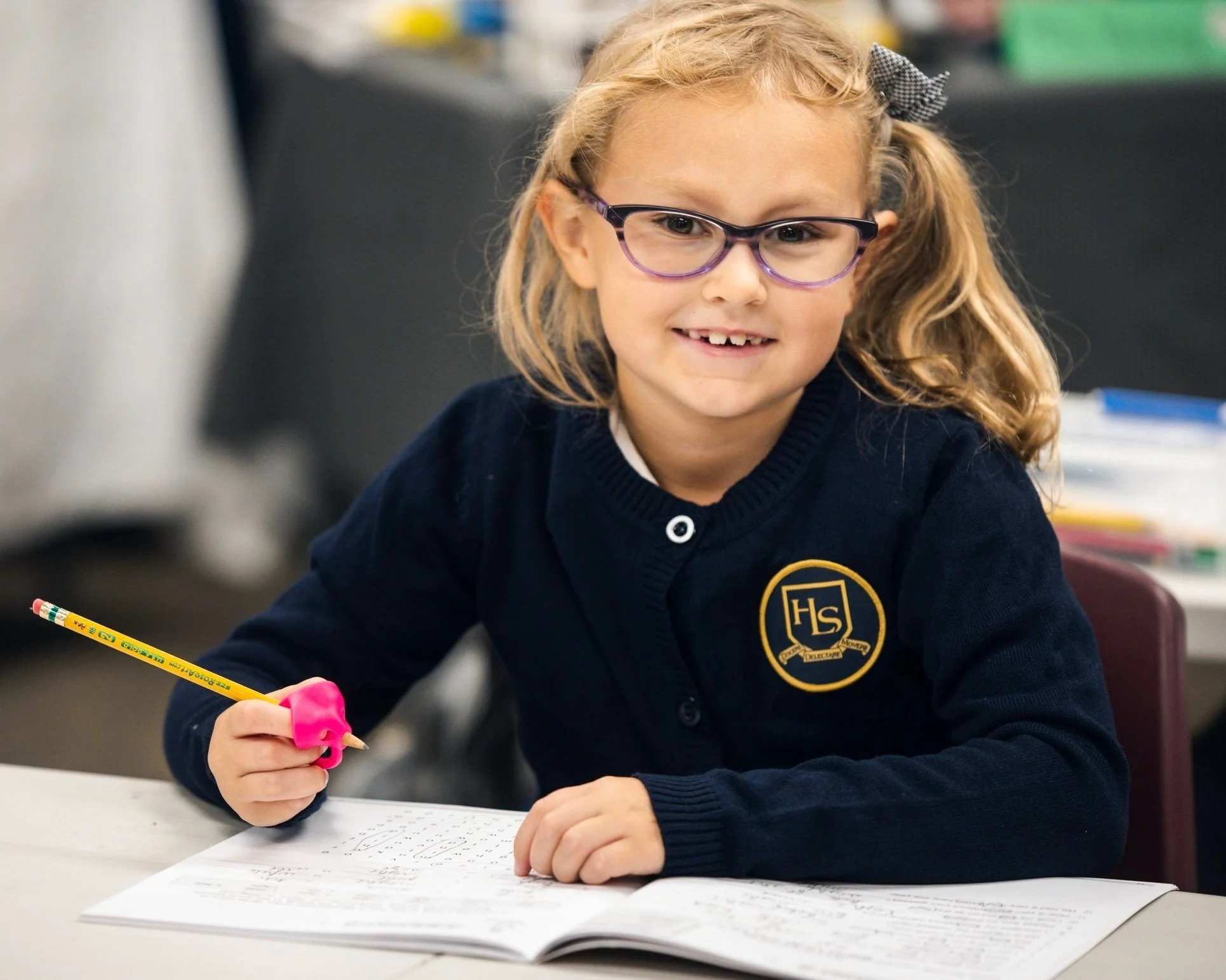JUNIOR KINDERGARTEN
2 DAY PROGRAM - WEDNESDAY & THURSDAY
The Jr. Kindergarten program is an excellent introduction to HLS and provides age-appropriate, quality content using real books, recitation, and repetition to help our youngest students become reading-ready and prepared for our thorough phonics-based Kindergarten. It is aimed at four and five-year-old students who intend to enroll in Kindergarten the following fall. Using the Memoria Press Junior Kindergarten curriculum, our goal is to foster Kindergarten readiness and offer a gentle introduction to a classroom setting.
The program focuses on letter and number recognition, introductory phonics, counting, letter formation, fine motor, and gross motor skills, work habits such as listening and attention to detail, and age-appropriate teaching methods that include games, art, music, and indoor/outdoor play.
For more information CLICK HERE
KINDERGARTEN THROUGH SECOND GRADE
Reading, writing, spelling, and arithmetic are the foundations upon which the tower of learning is built, and they are given the highest priority in K-2nd grades. The basic skills, work habits, and attitudes formed in the primary years are of crucial importance.
PHONICS AND READING
Phonics is the system of letter-sound association taught to children for the purpose of learning to read and spell. Phonics is most effective when taught systematically, thoroughly, intensely, and in a logical and time-tested sequence.
Our primary resource for phonics instruction in kindergarten is the Memoria Press First Start Reading, a program which teaches correct pencil grip, manuscript form, consonant and short vowel sounds, three-letter word formation, consonant blends, and long vowels/silent e. Common words which do not fit into any word family are introduced after students learn to blend three-letter words. First Start Reading teaches students to read in kindergarten using stories with a high percentage of phonetic words.
Phonics and spelling continue in 1st and 2nd grades using the SRA phonics series. In 1st grade, students continue to develop reading comprehension with whole books, which captivate and motivate children and are preferred over basal readers. First graders read children’s classics such as Little Bear, Caps for Sale, The Story about Ping, Billy and Blaze, etc. Second graders read The Courage of Sarah Noble, Little House in the Big Woods, and Mr. Popper’s Penguins. Spelling, penmanship, composition, and vocabulary lessons are taught in the context of literature instruction.
A rich language experience provided both at home and in school, is an important factor in reading success. Students memorize poems and Scripture and enjoy children’s classics read by teachers and parents during read-aloud time.
ARITHMETIC
Number formation, counting, time, calendar, measurement, and money are the skills students continue to build, along with mastery of addition and subtraction facts through 18. In 2nd grade, the students also begin multiplication with the 1x, 2x, 5x, and 10x facts. Students learn number sense by skip counting, games, and drills, all of which make math time enjoyable and help students achieve immediate recall of math facts—the primary goal in K-2nd grades.
SPELLING & PRINTING
Students develop visual memory for accurate spelling by a systematic study of phonics, word families, spelling rules, and a lifetime of seeing, reading, and writing words correctly. It is extremely important to reduce opportunities for children to write or see misspelled words. Young students who are allowed to spell creatively or phonetically have a confused visual memory that takes many years to overcome.
Copybook is an exercise consisting of copying sayings, maxims, Scripture, and poetry in the student’s best handwriting. Copybook is an important step in developing good penmanship, punctuation, and spelling. Habits of good penmanship are instilled early. The discipline of neat and legible handwriting is an aid to spelling and instills the value of accurate, careful work—an important academic skill that carries over into every aspect of learning. In 2nd grade, students continue to practice manuscript while also beginning cursive script with Memoria Press’ New American Cursive program.
GEOGRAPHY, HISTORY & SCIENCE
Our Read-Aloud program consists of a set of thirty books, one book for each week. The Read-Alouds provide a rich language experience for students as each book is read aloud each day the class meets and is accompanied by oral questions and discussion. Students learn new and interesting words and delight in rhyme and word play. They learn about holidays, history, geography, science and more. The books are beautiful in both prose and art. For geography, students work with globes and maps to learn continents, oceans, major countries, and basic geography terms. Second graders learn U.S. states, rivers, and the Great Lakes. In science, students learn about seasons and the weather, and take nature walks to collect leaves, flowers, acorns, bugs, and more!
3RD & 4TH GRADES
Our formal classical curriculum begins in 3rd grade, carefully preparing students with foundational knowledge and the important academic skills to successfully read and enjoy the rich literature content in a classical education. In addition, analytical and critical thinking skills are developed as 3rd & 4th grade as students begin the study of Latin grammar. In preparation for mathematics, accuracy and automaticity with arithmetic continues to be emphasized in the elementary years.
Students learn from well-designed materials, high quality content, and teacher-directed lessons presented by knowledgeable and enthusiastic teachers. Our emphasis on mastery learning motivates students to work and learn, providing them the opportunity to experience the joy of learning. Regular breaks are scheduled each day for physical exercise, recreation, music, drawing, art, and review games.
Mondays and Tuesdays are home study school days facilitated by parents. Students follow reading assignments, review material and practice content taught by the teachers on school days. Teachers partner with parents through weekly newsletters to guide their child’s home study and assist them in developing effective homework and study habits. In 3rd and 4th grade, students spend approximately two hours on Monday and Tuesday completing their home study assignments.
We are blessed by a supportive parent fellowship community that collaborates with teachers and the school to provide various enrichment and co-curricular opportunities that enrich the JK-4 program such as field trips, holiday events and special school activities.
MUSIC AND CHRISTIAN STUDIES
In Christian Studies, students read or listen to Bible stories from the Golden Children’s Bible and memorize Bible verses and prayers. Students receive music instruction once a week in the basic elements of music, including ear training and note reading. All K-4 students participate in Camarata choir once weekly and enjoy performances twice a year.
PHYSICAL EDUCATION
Students have Physical Education once a week. PE provides 30 minutes of exercise as well as the opportunity to play fun childhood games. Our PE instructor works to develop basic motor and motion skills, such as running, skipping, running backwards, and flexibility, as well as sportsmanship and team play.








